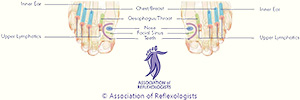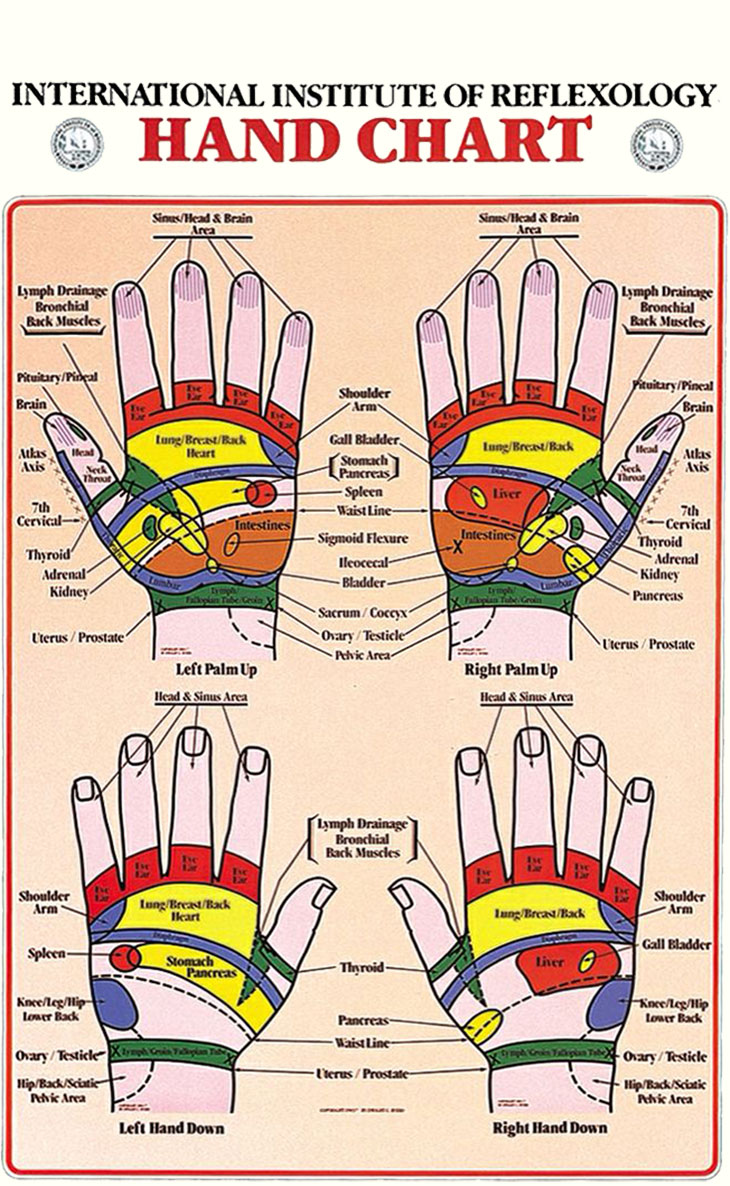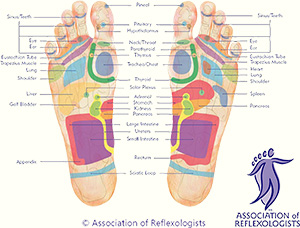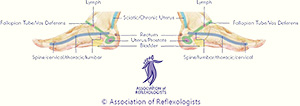Reflexology By Paula
History
Evidence of reflexology has been found on a wall painting in an Egyptian tomb dating back to about 2,330 B.C.; it can also be traced back to ancient India and China. Reflexology as it is known today is attributed to the work of Eunice Ingham, who mapped out reflex points on the feet and hands. Her original work is taught exclusively by the school that she founded, The International Institute of Reflexology, The Ingham Method (IIR).
Reflexology is a specific technique that works on precise reflex points on the hands or feet, based on the principle that these reflex points correspond to particular organs, glands and structures in the body. In stimulating these reflex points a state of deep relaxation is brought about, stimulate the body's own healing process and help the person return to a state of balance and well-being. Reflexology is a holistic, non-invasive therapy which addresses mental, physical and emotional health. Click the image right to see a larger representation.
Click for larger image of planter footmap.
How Reflexology Works
There are many documented case studies that demonstrate the effectiveness of reflexology. The China Reflexology Association has thousands, and two American reflexologists have established the Reflexology Research Project which documents current research into the therapy.
There are a number of different theories regarding how reflexology might work. Reflexology helps stimulate or sedate the normal functions of the body, working all the systems: nervous, hormonal, lymphatic, etc.. and our energy pathways (known as meridians on which acupuncture points lie,) to encourage healing and restore equilibrium or balance.
The nervous system is made up of millions of nerve cells that all communicate with one another to control the body and maintain homeostasis. These cells detect what is happening both inside and outside the body and it is estimated that the feet contain over 7,300 nerve endings which are stimulated through reflexology. Reflexology is thought to ‘stimulate’ and help clear nerve pathways so that impulses can be transported efficiently. ‘A short-circuit’ is often caused by tension putting pressure on a single nerve or nerve plexus that supply a structure or organ. As tension is eased through reflexology, pressure on the nerve(s) and vessels is relaxed, improving the flow of blood and oxygen-rich nutrients to all parts of the body.
All living and non-living things are a collection of atoms which are positively and negatively charged. Atoms can lose, gain or share electrons with other atoms and when this occurs a chemical reaction takes place. Electron interactions are the basis for all chemical processes in the body and therefore all process are fundamentally electrical. The energy within the body flows through specific channels or pathways which can become congested or blocked, impacting on health. By applying pressure to specific points on the hands & forearms, lower legs & feet the Reflexologist helps the body to heal itself and return to a healthy state. This concept of energy will be familiar to some of you. It is known as Chi, Qi, Ki, or Prana. Reflexology is also thought to strengthen our energy fields so we can cope better with environmental stresses.
Our body’s feel pain through the brain via a nerve impulse from a sensory pain receptor travelling to the brain where it is recognised as pain.Certain chemicals in the body are essential for this nerve impulse to be transmitted. One of them is known as substance P. These substances are our own natural painkillers, endorphins and enkephalins.  They are found in the limbic system of the brain and spinal cord and inhibit pain by releasing substance P. In addition the pain-relieving affect has been linked to improved memory and learning, feelings of pleasure and euphoria, control of body temperature and regulation of hormones. Through reflexology we are able to tap into this analgesic effect, acting on both the physical transcutaneous electrical nerve stimulation and psychological state.
They are found in the limbic system of the brain and spinal cord and inhibit pain by releasing substance P. In addition the pain-relieving affect has been linked to improved memory and learning, feelings of pleasure and euphoria, control of body temperature and regulation of hormones. Through reflexology we are able to tap into this analgesic effect, acting on both the physical transcutaneous electrical nerve stimulation and psychological state.
Click for larger image of Dorsal footmap.
Feet are sometimes referred to as the ‘U’ Bend of the body because they are the furthest point from the heart. Sometimes during a treatment grittiness like grains of sand or a bit larger, can be felt by the reflexologist during a treatment. These are thought to be calcium crystal deposits, lactic or uric acid or lymphatic deposits that have accumulated in the feet. If found the reflexologist would work these away to prevent accumulation. Giving nature a chance to carry away the waste matter and restore normal circulation to the affected part or parts.
Who may benefit?
Most people may benefit from reflexology. It treats the causes not just the symptoms and may bring relief to a wide range of acute and chronic conditions. Clinical reflexology is not a beauty therapy or a foot massage; it is a clinical treatment with results. It is totally safe for people of all ages, from babies to the elderly, for pregnant women and those undergoing chemotherapy.
How does it help?
The body has an amazing ability to heal itself. Following illness, stress, injury or disease, it can be in a state of 'imbalance' and vital energy pathways may become blocked and congestion occurs. This prevents the body from functioning effectively. By working with the body's own natural resources, reflexology may help restore its natural equilibrium and encourage healing. Click the image right to see a larger representation.
Anxiety
Click for larger image of Medial footmap.
Many people suffer in silence with their anxiety and feel uncomfortable and sometimes in fear of being part of society and may even such themselves away so they do not have to be part of it. Anxiety may be crippling, an obstacle at work or refraining from work, from letting other people into our lives or keeping us in a constant state of stress, fear and nervousness. It maybe you have have difficulty falling or staying asleep, feelings of depression or hopelessness, feeling tired all the time with little energy. Anxiety may make us feel bad about ourselves which may induce self-harming or hurting ourselves in some way. Or it may make relaxation impossible being in a constant state of worry that you are unable to control; thinking something awful might happen.
Stress and Reflexology
Stress is a modern term that simply means you are experiencing an abnormal amount of pressure. A certain amount of pressure is essential to help us meet life’s challenges, release our creativity and fuel our continued personal growth. Once pressure falls outside the range with which you feel comfortable, it may lead to the unpleasant physical and emotional symptoms associated with distress.
 It is common knowledge that uncontrolled stress may trigger a great many diseases and disorders from insomnia and gastric ulcers, high blood pressure, asthma and migraine to depression and chronic fatigue.
It is common knowledge that uncontrolled stress may trigger a great many diseases and disorders from insomnia and gastric ulcers, high blood pressure, asthma and migraine to depression and chronic fatigue.
Click for larger image of Lateral footmap.
For a long time, such problems have been something to live with in our day-to-day lives, however, reflexology and other therapies may help you relax, re-gain control, and give you your ‘ME TIME,’ keeping you in the best possible health to cope with extra pressure when the need arises.
Reflexology may reflect positively with:
- Irritable bowel syndrome and other digestive disorders
- Insomnia
- Sinus problems
- Headaches or migraines
- Stress and tension
- Muscular pain
- Depression or anxiety
- Skin conditions eg. eczema, psoriasis and dermatitis
- Low energy levels
- Frequent colds, low immunity and autoimmune diseases
- Hay Fever
- High Blood Pressure
- Diabetes
- Hormonal imbalances
Whilst reflexology works very well alongside conventional medicine, it should never be used in place of seeking professional medical advice.
Why choose Reflexology?
As a worldwide healing tradition, reflexology allows the individual more control over their own health and provides the opportunity for self-help through hand reflexology that may be demonstrated by a practitioner. The therapy offers less harmful, drug free, healing approach to ailments and to the maintenance of health. Reflexology treats the body as a whole and endeavors to get to the root cause of problems and not just treat the symptoms; reflexology may often help where other treatments have failed.
Quite often there are indications of congestion in the feet before any symptoms manifest themselves in the body; this is in part due the 7300 nerve endings in each foot. Therefore, reflexology is a useful aid in both the prevention of illness and regular maintenance treatments may promote health and well being.
What may I expect to feel during a treatment?
A firm pressure is applied which is not ticklish as the fingers and thumbs work over the feet. Some people experience sensations: twinges, grittiness or lumpiness, tenderness and the flow of energy. The treatment is very relaxing and clients often go into an ‘alpha’ state; the state achieved just before sleep and before waking up. The brain is deeply relaxed but aware, receptive and able to make connections.
How may I expect to feel after a treatment?

Click for larger image of Medial footmap.
You should be totally relaxed and ‘chilled out’, although some clients prefer to use the time to chat or talk about life. You may feel tired and it’s good to plan a quiet day or night after a treatment to fully appreciate the benefits. Reflexology continues to promote wellbeing in the body even after the treatment and you may notice changes from a state of relaxed calm, and possibly a sleepy sensation, to feeling energized, and revitalized with a ‘spring in your step.’
Hand Reflexology
Hand reflexology is great for those who have a foot phobia or who have extremely sensitive feet or for individuals where the feet are not accessible. It enables a person to receive all the benefits of foot reflexology and vertical reflexology through the hands. It is a treatment in its own right and not a hand massage, although many of the techniques feel wonderful. Hand reflexology is often integrated into classical foot reflexology and as part of Indian Head Massage.
Hand reflexology is a shorter treatment and is excellent for people who are short of time and for self-treating at home in between treatments.
Reflexology Articles
What does research say about Reflexology www.takingcharge.csh.umn.edu/search/reflexology
www.facty.com/lifestyle/wellness/ten-ways-your-body-benefits-from-reflexology/10/ (lots of adverts with this article)
There are many interesting reflexology articles on the Positive Health Website which if Free. www.positivehealth.com
I have listed a selection below hyperlinks of some which you may wish to check out below but there are more.
- Research and Reflexology by Lynne Booth. Issue 232 Aug 2016
- Reflexology for children and Babies by Lynne Booth. Issue 196 July 2012
- Back issues and reflexology support by Lynne Booth. Issue 216 Aug 2014
- Case Study 67 – Reflexology for Psoriasis and Arthritis by Kate McKennan. Issue 67 August 2001
- Case Study 69 – Reflexology for ME/Chronic Fatigue by Kath Morrell. Issue 69 Oct 2001
- Gentle Touch Reflexology by Sue Ricks. Issue 67 Aug 01
- Reflexology, Caring for older People by Lynne Booth. Issue173 Aug 2010
- Reflexology and Mental Illness by Gwen Potts. Issue 234 Nov 2016
- Reflexology and Shoulder Issues by Lynne Booth. Issue 187 Oct 2011
- Reflexology, helping to alleviate migraines and headaches by Lynne Booth. Issue 175 2010
- Reflexology: Physical, Mental, Emotional and Spiritual effects by Elena Francesca. Issue 200 Nov 2012
Massage, Reflexology By Paula, Edinburgh, Reflexology, Limbic Reflexology, holistic massage, Health, Edinburgh, maternity, testimonials,facial, paula, wellbeing, Reflexology By Paula, Edinburgh, Reflexology, Limbic Reflexology, Midlothian, Massage, treatments, Reflexology By Paula, reflexology, Reflexology By Paula, Edinburgh, Reflexology, Limbic Reflexology, Health, Edinburgh, maternity, testimonials, facial, paula, International Institute reflexology, deep tissue massage, Midlothian, Massage, treatments, Reflexology By Paula, reflexology, holistic, therapy, Bowen, indian head massage, hot stone massage, holistic massage, Health, Edinburgh, maternity, testimonials, facial, paula, International Institute reflexology, deep tissue massage, Midlothian.
Looking for something special Search Reflexology By Paula website






